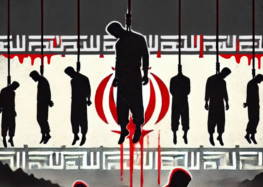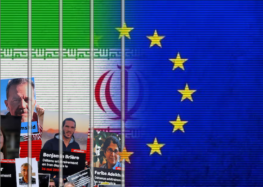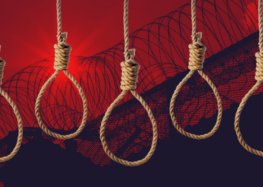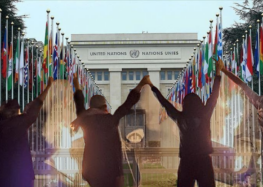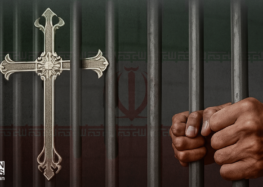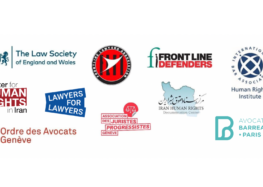Information Withheld about Detainees Prevents Defense, Raises Fears
(8 September 2009) Iranian authorities have released little or no information about many of the approximately 400 persons who remain detained for expressing their objections to the contested 12 June presidential elections, violating international standards for due process and raising deep concerns about their health and safety, according to the International Campaign for Human Rights in Iran.
The Campaign particularly highlighted the cases of prisoners who have had little or no contact with their families and lawyers, including Abdollah Momeni, Ahmad Zeidabadi, Mohammad Maleki, Keyvan Samimi Behbahani, Kourush Zaim, Mostafa Tajzadeh, Mohammad Reza Jalaipour, Mohammad Ramazanzadeh, Shapour Kazemi, and Shiva Nazarahari. The authorities have not provided any details about their situation or charges against them.
Since the 12 June elections, the Judiciary has admitted to detaining as many as 4000 protestors and well-known personalities and has said that at least 400 of them remain in detention.
“Not only are such temporary detentions an abuse of the legal system, but holding prisoners in incommunicado detention, lengthy solitary confinement with interrogations lasting days and nights, and withholding any information from the families and lawyers are grave breaches of international law which have, and will continue to result in widespread global condemnation,” said Hadi Ghaemi, the Campaign’s spokesperson.
“The authorities are willfully insuring that detainees will be denied justice, and punishing their families by inflicting uncertainties and anxieties,” he said.
Abdollah Momeni, spokesperson for the Advar Tahkim Vahdat Organization [Alumnae of Offices to Foster Unity Organization], was arrested at one of Mehdi Karrubi’s election campaign offices at midnight on 21 June. According to his wife, Adineh Vand, she still doesn’t know where he is being held or the charges against him. After two weeks of detention, Momeni called his wife for the first time, only for few seconds. He was allowed only a brief family visit after a month in detention. His wife has not received any phone calls or any other contacts from him for the past 35 days. Adineh Vand told the Campaign that in his telephone calls, Momeni had indicated he believed he is being held at Evin prison but during their only visit, he had been brought to the Evin prison complex from somewhere else, and she did not know exactly where he is being held. During the meeting she noted that he had lost much weight and was so weak that he could not stand on his feet, and his brother and wife had to help him to walk to the visitation room.
Ahmad Zaidabadi, the director of Advar Tahkim Organization and a prominent journalist, was detained on 13 June at his home. A person posing as a delivery man lured him out of his house and unidentified agents kidnapped and took him away. In protest against the illegal manner of his detention, lack of charges against him, and the conditions of his detention, Zaidabadi was on a hunger strike during the first 17 days of his detention.
His wife, Mahdieh Mohammadi, was able to visit him only after 65 days of having no access to him. During their visit, Zaidabadi told her that he had spent 35 days in solitary confinement, in total isolation, where there was no sound, no light, and no human contact. He told her he felt like he was in a grave, developing serious mental disorientation, and becoming suicidal. Since he could not find any means for committing suicide, he started to scream nonstop. The prison guards eventually realized that he is on the verge of insanity and transferred him to a different solitary cell.
During the visit, Zaidabadi told his wife that interrogators had asked him to give guarantees that he would never engage in political activism, although they had not formally charged him. Mohammadi told the Campaign that since that visit, she has had no contacts from Zaidabadi and she had received no other information about him or his case.
Mohammad Sharif, Zaidabadi’s lawyer, has been pursuing his case with Judiciary officials on a daily basis, but they have refused to inform him about any details. Sharif does not even know what court branch Zaidabadi’s case is being reviewed in and he has not been able to access his client to sign papers appointing him as his lawyer.
Sharif, a well-known human rights lawyer who is representing many prisoners, is the lawyer for both Momeni and Zaidabadi. He told the Campaign that, “Unfortunately all my efforts for getting the legal papers signed by my clients have failed. To get these processed, I first need to know what court branch is in charge of these cases, but months after their detention, I have no information whatsoever about these files.”
Sharif noted that while the law allows for a judicial official to issue a renewable temporary detentions for two months at a time, such detentions without trial can lead to lengthy detentions, as long as one year or more, and eventually the investigating judge may reach the conclusion that no crime has been committed, as he has observed in many cases before.
Many prominent personalities remain in detention without any access to the outside world, including Mostafa Tajzadeh, Feizollah Arab-Sorkhi, and Abdollah Ramazanzadeh. Ramazanzadeh, the spokesperson in Khatami’s cabinet, was arrested on 13 June in the street when he was seriously beaten, causing injuries to his head and rib cage. Since his detention, he has not been charged and the location of his imprisonment remains unknown. After 74 days of detention, Ramezanzadeh was brought to the mass trials in which he asked journalists to tell his family that he was fine. Up to that date, his family had no information about his situation.
The Campaign has received information indicating that other prisoners, about whom no information is available about their legal situation, have suffered beatings and other ill-treatment, including Keyvan Samimi. The family of Mohammad Maleki, a retired university professor and a former chancellor of Tehran University, has received no information about him since his arrest. Maleki, who suffers from prostate cancer, was arrested at his home while he was undergoing treatment.
Among the 400 people who remain in detention since the post election protests, many are ordinary citizens. The Campaign regularly receives messages from their families and colleagues that they have no access to information about the detainee’s situation. One such case is that of Ali Bikas, a PhD student and activist for Azerbaijani ethnic rights who was arrested on 20 June as he exited his university dormitory. He has only been able to inform a friend that he is being held at ward 209 of Evin prison. Since then his family has received no further information about him.
Even the situations of prisoners whose detention orders have been changed to release on bail, or those who have appeared in trials in recent weeks, are clouded in uncertainty and ambiguity. Mohammad Reza Jalaipour, an official with Mousavi’s youth campaign was due to be released on bail in the amount of $200,000 (200 million toman). His family posted bail, spending eleven hours in front of Evin prison and anticipating his release, but never received information as why he has not been released.
In addition, the authorities are setting bails in such excessive amounts that the families cannot afford to pay them, thus prolonging temporary detentions. Shiva Nazarahari, a well-known human rights activist and reporter, is one such example. The authorities have set bail for her release in the amount of half-a-million dollars (500 million toman). His mother has publicly announced that her only asset, her house, is worth only $80,000 (80 million toman) and there is no way she can afford to post such an exorbitant amount for the release of her daughter.
Masoud Bastani, a journalist who was detained when he went to the Judiciary to follow up on his wife’s detention, remains in solitary confinement. He was forced to make “confessions” during a recent trial, but his situation and the charges against him remain unclear.
The Campaign called for the immediate release of all detainees who are held without charge, for respect for international standards of due process including access to lawyers and family members, and for complete transparency with regard to the whereabouts and charges against all detainees.

